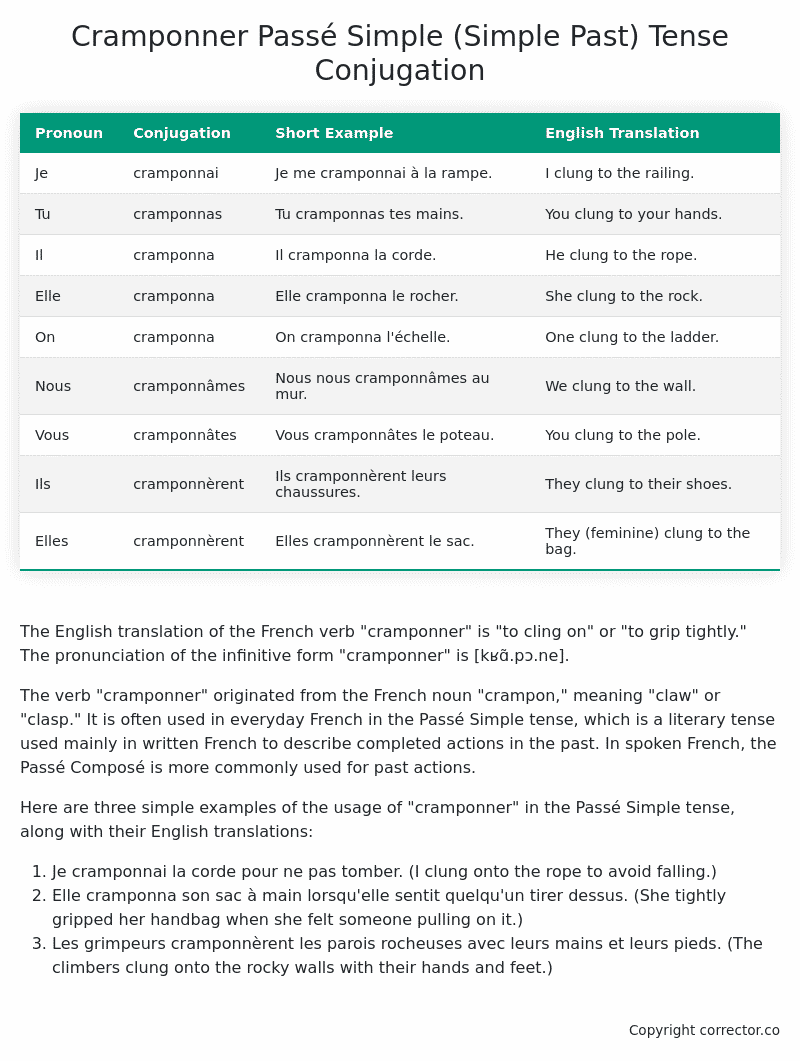Passé Simple (Simple Past) Tense Conjugation of the French Verb cramponner
Introduction to the verb cramponner
The English translation of the French verb “cramponner” is “to cling on” or “to grip tightly.” The pronunciation of the infinitive form “cramponner” is [kʁɑ̃.pɔ.ne].
The verb “cramponner” originated from the French noun “crampon,” meaning “claw” or “clasp.” It is often used in everyday French in the Passé Simple tense, which is a literary tense used mainly in written French to describe completed actions in the past. In spoken French, the Passé Composé is more commonly used for past actions.
Here are three simple examples of the usage of “cramponner” in the Passé Simple tense, along with their English translations:
- Je cramponnai la corde pour ne pas tomber. (I clung onto the rope to avoid falling.)
- Elle cramponna son sac à main lorsqu’elle sentit quelqu’un tirer dessus. (She tightly gripped her handbag when she felt someone pulling on it.)
- Les grimpeurs cramponnèrent les parois rocheuses avec leurs mains et leurs pieds. (The climbers clung onto the rocky walls with their hands and feet.)
Table of the Passé Simple (Simple Past) Tense Conjugation of cramponner
| Pronoun | Conjugation | Short Example | English Translation |
|---|---|---|---|
| Je | cramponnai | Je me cramponnai à la rampe. | I clung to the railing. |
| Tu | cramponnas | Tu cramponnas tes mains. | You clung to your hands. |
| Il | cramponna | Il cramponna la corde. | He clung to the rope. |
| Elle | cramponna | Elle cramponna le rocher. | She clung to the rock. |
| On | cramponna | On cramponna l’échelle. | One clung to the ladder. |
| Nous | cramponnâmes | Nous nous cramponnâmes au mur. | We clung to the wall. |
| Vous | cramponnâtes | Vous cramponnâtes le poteau. | You clung to the pole. |
| Ils | cramponnèrent | Ils cramponnèrent leurs chaussures. | They clung to their shoes. |
| Elles | cramponnèrent | Elles cramponnèrent le sac. | They (feminine) clung to the bag. |
Other Conjugations for Cramponner.
Le Present (Present Tense) Conjugation of the French Verb cramponner
Imparfait (Imperfect) Tense Conjugation of the French Verb cramponner
Passé Simple (Simple Past) Tense Conjugation of the French Verb cramponner (You’re reading it right now!)
Passé Composé (Present Perfect) Tense Conjugation of the French Verb cramponner
Futur Simple (Simple Future) Tense Conjugation of the French Verb cramponner
Futur Proche (Near Future) Tense Conjugation of the French Verb cramponner
Plus-que-parfait (Pluperfect) Tense Conjugation of the French Verb cramponner
Passé Antérieur (Past Anterior) Tense Conjugation of the French Verb cramponner
Futur Antérieur (Future Anterior) Tense Conjugation of the French Verb cramponner
Subjonctif Présent (Subjunctive Present) Tense Conjugation of the French Verb cramponner
Subjonctif Passé (Subjunctive Past) Tense Conjugation of the French Verb cramponner
Subjonctif Imparfait (Subjunctive Imperfect) Tense Conjugation of the French Verb cramponner
Subjonctif Plus-que-parfait (Subjunctive Pluperfect) Tense Conjugation of the French Verb cramponner
Conditionnel Présent (Conditional Present) Tense Conjugation of the French Verb cramponner
Conditionnel Passé (Conditional Past) Tense Conjugation of the French Verb cramponner
Conditionnel Passé II (Conditional Past II) Tense Conjugation of the French Verb cramponner
L’impératif Présent (Imperative Present) Tense Conjugation of the French Verb cramponner
L’impératif Passé (Imperative Past) Tense Conjugation of the French Verb cramponner
L’infinitif Présent (Infinitive Present) Tense Conjugation of the French Verb cramponner
L’infinitif Passé (Infinitive Past) Tense Conjugation of the French Verb cramponner
Le Participe Présent (Present Participle) Tense Conjugation of the French Verb cramponner
Le Participe Passé (Past Participle) Tense Conjugation of the French Verb cramponner
Struggling with French verbs or the language in general? Why not use our free French Grammar Checker – no registration required!
Get a FREE Download Study Sheet of this Conjugation 🔥
Simply right click the image below, click “save image” and get your free reference for the cramponner Passé Simple tense conjugation!

Cramponner – About the French Passé Simple (Simple Past) Tense
Formation
Usage
Narration
Historical Context
Interactions with other tenses
Passé Composé
Imparfait
Conditional and Subjunctive
Summary
I hope you enjoyed this article on the verb cramponner. Still in a learning mood? Check out another TOTALLY random French verb conjugation!


